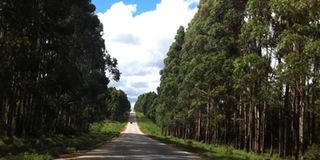Losses in forest business alarm WWF

What you need to know:
It has called on the government to prepare a business model for running the forest economy and setting regulations for the markets of timber, charcoal and other forest products.
Dar es Salaam. Tanzania is heavily losing economically from forests while deforestation is escalating, the World, Wide Fund for Nature (WWF) has warned.
It has called on the government to prepare a business model for running the forest economy and setting regulations for the markets of timber, charcoal and other forest products.
WWF executive director Amani Ngusaro told BusinessWeek recently that there is a need to formalise forest businesses.
Informal forest businesses and lack of business model for running forest economy are the major cause of deforestation in Tanzania, according to Dr Ngusaro.
He said the growth of informal forest businesses such as charcoal and poorly organised forest farms have been accelerating deforestation rate.
“WWF calls on the government to design a business model for commercialisation of forest farming and related businesses. Without the commercialisation of production and distribution of forest products deforestation will continue to take place at a rapid scale, causing climate change,” he says.
According to him, the country has to embark on the commercialisation of forest farming to reduce the growing rate of deforestation, which is 370,000 hectares annually.
WWF Tanzania conservation manager Simon Lugandu says the country lacks a clear policy on land use planning. The situation gives loopholes for deforestation arising from haphazard farming, poor livestock-keeping and improper development of human settlements.
“The country must put in place a clear policy on land use plans in both rural and urban areas. The current directive banning charcoal traders to transport charcoal from one district to another must be guided by clear policy on land use plan,” Dr Lugandu says.
WWF Energy and Climate Change coordinator Roy Brown clarifies that there is a greatest challenge in maintaining a sustainable balance between consumption and production of forest resources.
“We have to find ways of maintaining a balance between planting trees and consumption of forest products. Banning of charcoal trade is not a solution,” says Mr Brown.
In so far as the prices of energy produced from industrial gas, electricity and other energy sources are not affordable, deforestation caused by charcoal trading will persists, according to him.
“Due to lack of a clear policy on forest economy and energy usage, there is neither a template on charcoal pricing nor pricing of industrial gas.”
Already, the Energy and Water Regulatory Authority has said it has no mandate to set a template on pricing biomass and industrial gas.
Early this month, Natural Resources and Tourism minister Jumanne Magembe banned the transport of wood and charcoal from outside of the district of origin.
The director of Land Use Planning Commission, Dr Stephen Nindi, said the law guiding local authorities on land use plans is in place, but the problem is on its implementation.
“The problem is that local authorities have not been enacting by-laws on preparing and forming land plans to guide the usage of land for sustainable and proper use of natural resources.”
If someone sets aside a plan for only forest and reserve lands, people will continue to scramble for such scarce resources, due to population pressures, according to him.
“Recognising this chronic problem, last year we formed a task force on land use planning activities and they have already prepared a document, which has been already submitted to the government.”
The land use plans for every district comprising every activities on land resources such as settlements, livestock development, infrastructure and other public projects must formed and guided by by-laws. Already the government has responded positively on preparing budget for land use planning, he said.




